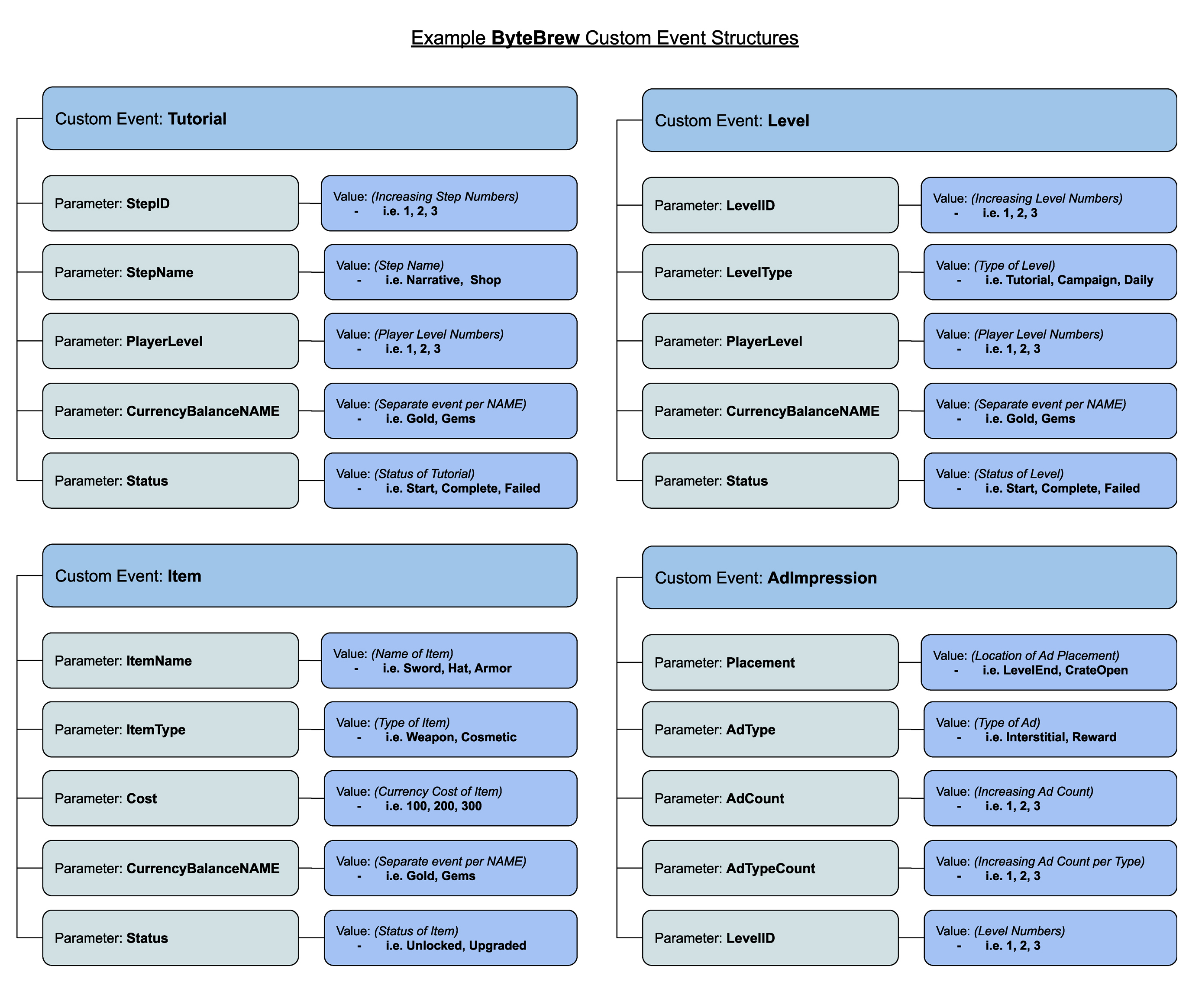Puzzle Games
In the Puzzle genre, setting up your game’s ByteBrew implementation to analyze and optimize the following questions will instantly start you on the right path for success:
How users are progressing through your game?
Where your users are churning?
Which game items and events your users engage with throughout their lifespan?
How are your users monetizing?
Where can you improve your monetization strategy?
What are your users enjoying?
What should you update to improve their experience?
See the implementation best practices below for what to implement when setting up your game with ByteBrew
Custom Events
Custom Events in ByteBrew enable you to deep dive across all of our extensive analytics dashboards. On ByteBrew, we built custom events to unlock unseen insights into your games with our unique event structure.
Custom Event Structure
Custom Events on ByteBrew allow for an unlimited number of key, value sub-parameters under the custom event. For example, you can have an event called “AdWatch” that has a subparameter under the event named “Networks” and the values of that Networks subparameter could be “Applovin, Unity, Google, etc.”. To illustrate our custom event structure visually, see the following diagram.

Recommended Custom Events to Track
To ensure you’re equipped from the get-go, we’ve made a list of sample custom events you should integrate for your game. See how to integrate Custom Events in your games platform integration documentation page here.
| Custom Events | Parameters | Value |
|---|---|---|
| Tutorial | StepID | Increasing Step Numbers (i.e. 1, 2, 3) |
| StepName | Step Name (i.e. Narrative, Shop) | |
| PlayerLevel | Player Level Number (i.e. 1, 2, 3) | |
| CurrencyBalanceName | Seperate Currency Event per Name (i.e. Gold, Gems) | |
| Status | Status of Tutorial (i.e. Start, Complete, Failed) | |
| Level | LevelID | Increasing Level Numbers (i.e. 1, 2, 3) |
| LevelType | Type of Level (i.e. Tutorial, Campaign, Daily) | |
| PlayerLevel | Player Level Number (i.e. 1, 2, 3) | |
| CurrencyBalanceName | Seperate Currency Event per Name (i.e. Gold, Gems) | |
| Status | Status of Level (i.e. Start, Complete, Failed) | |
| Item | ItemName | Name of Item (i.e. Sword, Hat, Armor) |
| ItemType | Type of Item (i.e. Weapon, Cosmetic) | |
| Cost | Currency Cost of Item (i.e. 100, 200, 300) | |
| CurrencyBalanceName | Seperate Currency Event per Name (i.e. Gold, Gems) | |
| Status | Status of Item (i.e. Unlocked Upgraded) | |
| AdImpression | Placement | Location of Ad Placement |
| AdType | Type of Ad (i.e. Interstitial, Reward) | |
| AdCount | Increasing Ad Count (i.e. 1, 2, 3) | |
| AdTypeCount | Increasing Ad Count per Ad Type (i.e. 1, 2, 3) | |
| LevelID | Increasing Level Numbers (i.e. 1, 2, 3) | |
Remote Configs
Using remote configs, you can make updates to your game on the fly without needing to ship new versions of your game to the stores. Adding remote configs to your games are a fantastic way to be agile and send updates or patches to players instantly. We recommend implementing remote configs throughout all parts of your game to allow you to tweak and tune as you analyze your game performance data. See a list of suggested remote configs below and learn how to integrate them in your games platform integration documentation page here:
| Config Name | Description | Examples |
|---|---|---|
| Level or Stage Difficulty | Update your game’s difficulty in-game remotely. | Enemy Spawn Rate, Number of moves, enemy health points |
| Ads | Turn on or off in-game advertising remotely. | Ads control (on/off) |
| Reward Amounts | Tune the rewards given to your users remotely. | Soft currency, hard currency, consumables, non-consumables |
| Game Inventory | Disable, enable or update gameplay items remotely. | Weapons, Power-ups, characters, consumables, non-consumables |
| Game Shop | Disable, enable or update items in the in-game shop remotely. | Store items, purchase price, item sales, promotions |
| Player XP Points | Edit the XP value thresholds for your users in-game remotely. | Rank points, player level points |
Push Notifications
No matter what genre of game or app, push notifications are an effective way to continuously engage your users. Take a look at best practices for your messaging strategy. See how to integrate Push Notifications in your games platform integration documentation page here.
| Push Notification Type | Type Description | Segment Setting |
|---|---|---|
| Day 1 Retaining Engagement Message | Message to new users what have not returned to your game or app within 24 hours of their latest session and it's their 1st day since installation. | Users who (1) First Played less than 48 hours ago, and (2) last played more than 24 hours ago. |
| Day 3 Retaining Engagement Message | Message to new users what have not returned to your game or app within 24 hours of their latest session and it's their 3rd day since installation. | Users who (1) First Played less than 96 hours ago, and (2) last played more than 24 hours ago. | Day 7 Retaining Engagement Message | Message to new users what have not returned to your game or app within 24 hours of their latest session and it's their 7th day since installation. | Users who (1) First Played less than 192 hours ago, and (2) last played more than 24 hours ago. |